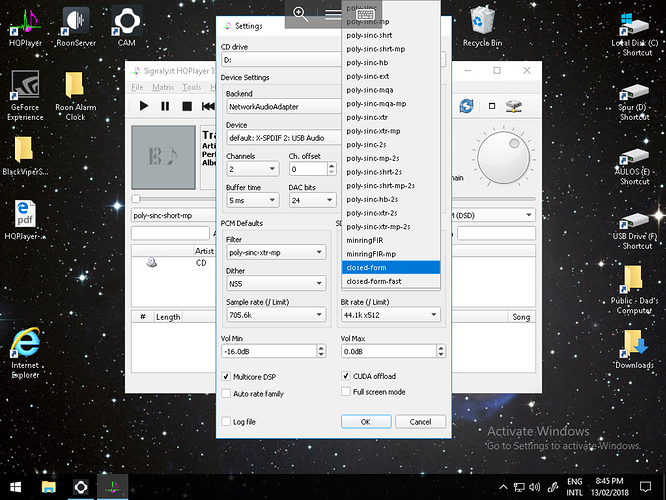I was doing pcm->pcm.
OK, sorry.
Sorry, what is closed form? I am using poly sinc -xtr for my upconversions to and playing DSD256 directly. I like it better than the -2s version.
A closed form expression generally excludes a limit. My understanding is that a closed form filter is designed to give an output after a finite number of steps (which may be large) rather than approach an output with increasing accuracy using an arbitrary number of taps. Schitt use a closed form filter and contend it sounds better.
In HQP the closed form filter is one of the longer filters in the time domain but not as long as xtr.
Thanks for the explanation. In HQP can you tell me which one(s) is (are) the closed form filter(s). Much appreciated.
Hi andy
IIrc, you first liked all upconverted to DSD best, then for a while reverted to PCM native and now are coming back to upconverting to DSD?
This is, funny enough, exactly my way, too 
I liked to extreme focus of redbook native but after a while came back to upconverted DSD because the focus is very good as well but the dimensionality in all directions is very addictive for me. The upconverted DSD is not just blown up, the focus and the size of the singer and instruments is still lifesize but the room just opened up immensly.
Thanks for your screenshot.
I never tried the closed form filter.
My favorite filter is the poly sinc mp but after my holidays I definitely will try the closed form.
Yeah, I chop and change a bit according to what I’m doing. I like PCM when I’m hearing the music from another room because the attack is better than upsampled DSD. I have now discovered that the DSD256+fs modulator preserves a large part of the attack in my system and the DSD stage is still there. I don’t think I have a great ear memory. I tend to like whatever I’m listening to.
Thanks, I will try the DSD256+fs as well, then 
How did you like the poly sinc mp filter?
I see myself coming back to this filters all the time 
Yes, I like poly-sinc-shrt-mp. I think it’s the one Jussi prefers. When you are trying things out have a listen to the minringFIR filters. They’re the shortest in the time domain that Jussi recommends. They sound exceptionally good for transients like harp, piano etc. but lose some depth of soundstage for me.
Edit: The poly-sinc filters take a heck of a time to start playing music at first though. What’s it building in there ?
Thanks andy
I will give it a try.
Which one do you prefer?
Plain vanilla or minimal phase?
What is the sonic difference between the normal and short variation of the same filter?
I generally prefer mp (no pre-ringing). With the minringFIR, however, I think I preferred the linear phase version as there was not much pre-ringing there to start off with.
The shrt variations are same basic design as their counterparts but are shorter in the time domain (better transients) with consequently gentler roll offs in the frequency domain.
Thank you.
Is it bad to wish the holidays abroad would be over on the first day to rush home and try things out on the hifi system 
Have you found your software to provide any benefits for PS Audio DirectStream DAC users? Based on what I have can discern, the best way to feed the DirectStream is with no upsampling at all. The DirectStream upsamples PCM and DSD to 20x DSD rate. This would seem to negate any benefits your software could provide.
Thoughts?
Thanks!
It’s not just you, ah to be human.
The very resolving system crew would probably disagree venomously.
What is your problem ![]()
Why so often with such a passive agressive undertone? ![]()
Obviously I have issues with the “not resolving enough” argument.
Who threw that argument at you in this thread?
No one. Obviously you have taken offence to the comment, so I apologize.
